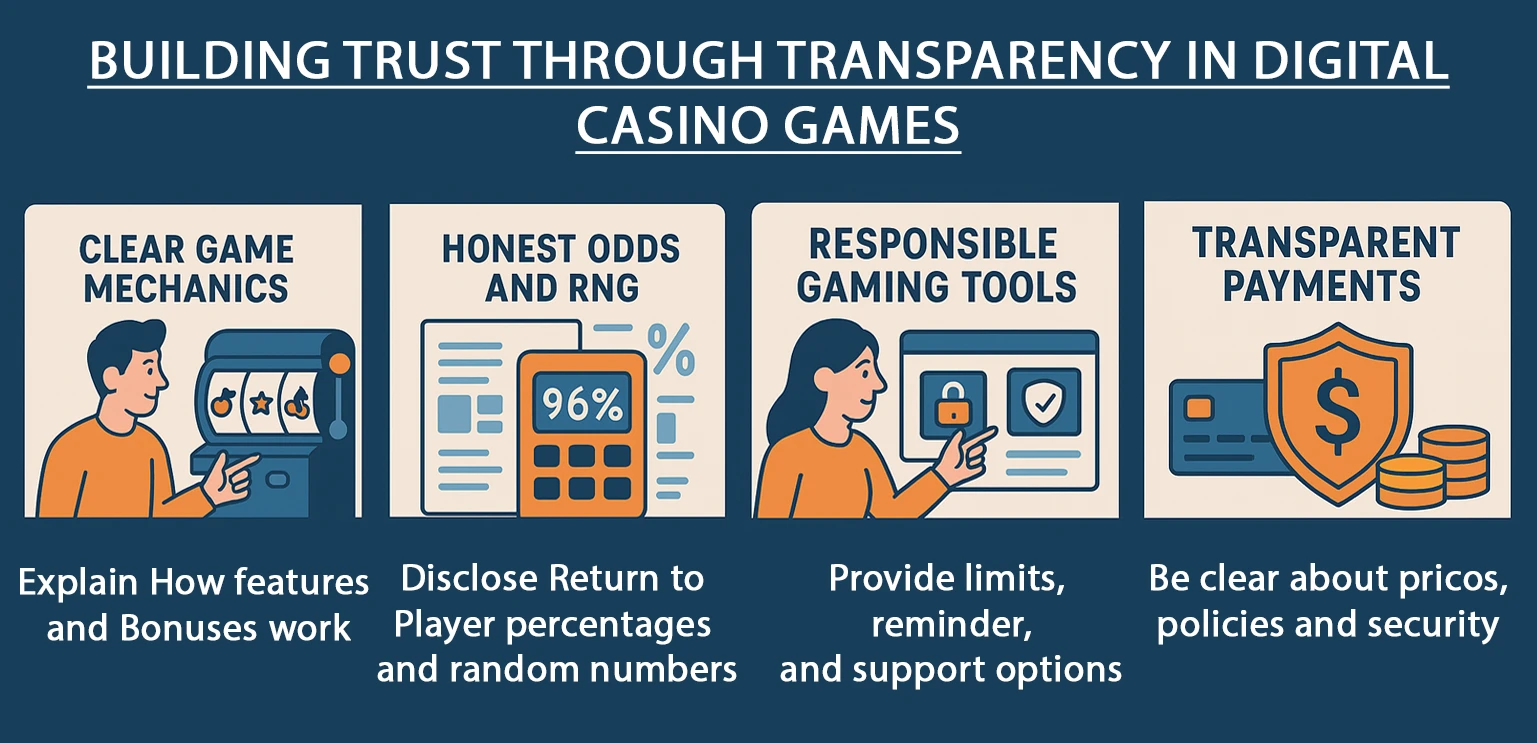How Transparency Builds Trust in Digital Casino Games
Trust is the foundation of every successful digital casino experience. Players spend not just their time—but often their money—on slot games, table games, and virtual gambling experiences. If they don’t feel confident in the fairness, safety, or honesty of a game, they’ll simply stop playing.
At GamixLabs, we’ve seen firsthand how building transparency into design and communication helps keep players engaged and loyal. In this article, we’ll explain how casino games can earn—and keep—player trust.

What Does Transparency Mean in the Casino Game Industry?
Transparency in digital casino games means being open, honest, and clear about how your game works, what players can expect, and how their data or money is handled.
Clear Communication of Game Mechanics
Simply explain features and functions. Whether it’s how spins work, how bonuses are triggered, or how coins are earned, players should never feel confused or misled.
Honesty in Odds and RNG Disclosure
Every casino game uses a Random Number Generator (RNG) to determine outcomes. But do players know that? Sharing Return-to-Player (RTP) percentages and basic RNG info increases trust. When a player knows the odds are real and random, they feel safer spending time and money.
Common Player Concerns and How Transparency Addresses Them
Are the Games Fair?
Players want to feel confident that the game is fair and not fixed. Transparency in RNG, payout percentages, and bonus conditions reassures them that the system isn’t out to trick them.
Are My Payments Safe?
Being open about payment processes, refund policies, and data security shows users that your platform respects their money and privacy.
Can I Control My Spending?
Giving players clear information about their spending habits—and tools to manage it—builds deep trust. Let them set limits, take breaks, or access support easily.
How UI/UX Contributes to Perceived Transparency
Your game’s design matters. A clean, easy-to-navigate interface tells players you have nothing to hide. Clear buttons, readable text, and accessible settings encourage players to explore and feel in control. Confusing layouts, on the other hand, can make players suspicious, even if the game is fair.
At GamixLabs, we prioritize clarity in every screen, from game rules to purchase confirmations.
Fair Play Features That Build Trust
Displayed RTP Percentages
Many top platforms now show RTP percentages on each game, right where players can see them. This simple move tells users, “We’re being honest about your odds.”
Responsible Gaming Tools
Tools like self-exclusion, spending trackers, and play-time reminders don’t just protect users—they show your brand cares. Trust grows when players feel like the game is working with them, not against them.
Transparency in Monetization: Pricing and Purchases
Players don’t mind spending money, but they do mind surprises.
Avoiding Pay-to-Win Systems
Avoid giving unfair advantages to paying players. This erodes the fun and fairness for everyone else. If a game requires purchases to compete or win, it’s important to be upfront about that.
Being Upfront About Odds and Value
If a player is buying a loot box or mystery spin, show them the chances of what they might get. Being honest about odds—even if they’re low—goes a long way toward building long-term loyalty.
GamixLabs' Approach to Ethical Casino Game Design
At GamixLabs, we build every game with a simple belief: trust is earned. We embed transparency into every layer:
- Game rules are written clearly.
- RNG and RTP information are disclosed when relevant.
- We design monetization that enhances fun, not pressure.
- Players have control over settings, volume, purchases, and more.
We work closely with partners to ensure every title we produce feels fair, respectful, and safe to play.
How Transparency Impacts Player Retention and Reputation
Transparency isn’t just about ethics—it’s smart business. When players trust your game:
- They come back more often.
- They’re more likely to spend.
- They recommend it to others.
- They report fewer support issues.
Reputation matters. And in today’s review-driven, app-store-powered world, a trustworthy game can spread faster than any ad campaign.
The Role of Regulation and Certification
Being transparent also means being compliant.
RNG Certification and Testing Labs
Many jurisdictions require that your RNG be tested and certified by a third-party lab. Displaying these certifications adds credibility and reassures players that your outcomes are genuinely random.
Regional Compliance and Player Protections
Whether you’re launching in Europe, the U.S., or Asia, legal requirements vary. Being transparent about which markets you’re certified in and how you protect users helps avoid confusion and build a stronger brand presence.
Conclusion
Trust doesn’t happen by accident—it’s designed into every click, spin, and screen. In digital casino games, transparency is the path to long-term success. From clear rules and odds to ethical monetization and certified fairness, the more honest your platform is, the more players will believe in it.
At GamixLabs, we don’t just create games—we help our partners build trusted digital experiences that players come back to, day after day.
Because in this business, trust is the ultimate jackpot.
Frequently Asked Questions
What does RTP mean in a slot game?
RTP stands for Return to Player—it’s the average payout a game offers over many spins, shown as a percentage.
How can I tell if a digital casino game is fair?
Check for visible RTP stats, certified RNGs, and user reviews. Reputable developers are open about these features.
What should a good casino game explain clearly?
Game rules, odds, purchase options, and how to control spending should all be easy to find and understand.
Do players care about transparency?
Yes—more than ever. Especially with real or virtual money involved, trust is key to retention.
Is it okay to use in-app purchases in casino games?
Yes, but be upfront about pricing, odds (if applicable), and whether purchases impact gameplay.
What tools help users stay in control?
Limit-setting, daily reminders, transaction history, and support access are all excellent features that show care and responsibility.